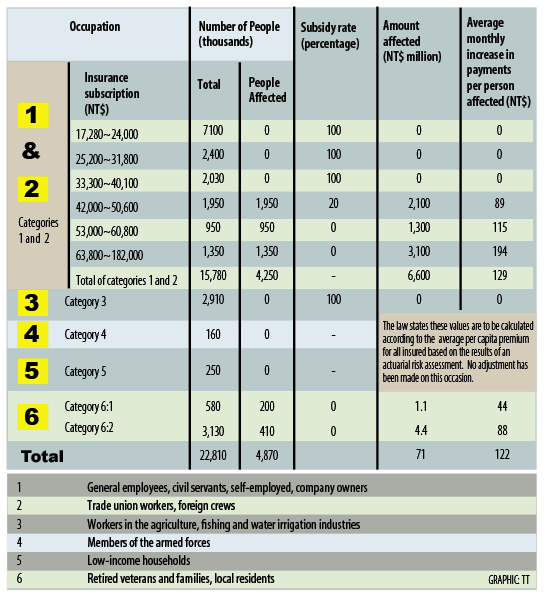The announcement of an imminent premium hike failed to impress the National Health Insurance Civic Surveillance Alliance, which panned the proposal yesterday as a temporary fix and warned that the problem would worsen unless there was a massive overhaul of the system.
A spokeswoman for the watchdog alliance, Eva Teng (滕西華), said the solution to the Bureau of National Health Insurance’s (BNHI) prolonged financial woes is an expedited amendment to the National Insurance Act (全民健保法) and the implementation of a second generation health plan that guards against dishonest doctors and medical institutions.
Doctors who overcharge the system and institutions that falsely inflate pharmaceutical costs are two major reasons for the BNHI’s problems, she said.

“The extra income accrued under the new premium plan will only be enough to save the bureau from insolvency in the short run … if the government refuses to implement comprehensive reform, the system will continue to lack transparency and the taxpayers still be in the dark on the real reasons behind the premium raise,” she said, urging the government to stop treating the public as its personal cash cow,” she said.
The second generation health plan will require the government to take tougher action against violators, and most importantly, those insured would be charged according to their salary brackets — a fairer way of distributing the burden, the alliance said, stressing that the Executive Yuan should implement the health plan by next year at the latest.
The proposed increase to a rate of 5.17 percent is expected to stabilize the bureau’s finance for two years — in other words, the government is hoping the political dividends conferred by the new adjustment will last until the 2012 presidential election, Teng said.
“A consensus on a second generation health plan has already been forged. There is no reason to wait for two years,” Teng said.
Meanwhile, Democratic Progressive Party (DPP) Legislator Chen Ting-fei (陳亭妃) yesterday criticized Department of Health (DOH) Minister Yaung Chih-liang’s (楊志良) surprise resignation last Monday as being a smokescreen designed to aid the passage of the premium increases.
It was unreasonable that the public had to pay increased premiums because of a failure by the DOH to collect debts owed by municipal health departments and negotiate rising pharmaceutical prices, she added.
“The whole resignation was a show … designed to mask President Ma Ying-jeou’s (馬英九) commitment to raise insurance premiums,” she said. “In the end, all these problems are still unresolved.”
DPP Legislator Lee Chun-yee (李俊毅) said that even though the government promised to exempt low-income earners from the full premium increase, the money used to do so would still come from taxes, increasing the burden on everyday taxpayers.
The Chinese Nationalist Party (KMT) caucus, on the other hand, yesterday praised the health insurance scheme, saying the premium adjustment was reasonable. KMT caucus secretary-general Lin Hung-chih (林鴻池) said the new scheme could guarantee social justice and stabilize society.
ADDITIONAL REPORTING BY VINCENT Y. CHAO AND FLORA WANG

Taiwan would benefit from more integrated military strategies and deployments if the US and its allies treat the East China Sea, the Taiwan Strait and the South China Sea as a “single theater of operations,” a Taiwanese military expert said yesterday. Shen Ming-shih (沈明室), a researcher at the Institute for National Defense and Security Research, said he made the assessment after two Japanese military experts warned of emerging threats from China based on a drill conducted this month by the Chinese People’s Liberation Army’s (PLA) Eastern Theater Command. Japan Institute for National Fundamentals researcher Maki Nakagawa said the drill differed from the

‘WORSE THAN COMMUNISTS’: President William Lai has cracked down on his political enemies and has attempted to exterminate all opposition forces, the chairman said The legislature would motion for a presidential recall after May 20, Chinese Nationalist Party (KMT) Chairman Eric Chu (朱立倫) said yesterday at a protest themed “against green communists and dictatorship” in Taipei. Taiwan is supposed to be a peaceful homeland where people are united, but President William Lai (賴清德) has been polarizing and tearing apart society since his inauguration, Chu said. Lai must show his commitment to his job, otherwise a referendum could be initiated to recall him, he said. Democracy means the rule of the people, not the rule of the Democratic Progressive Party (DPP), but Lai has failed to fulfill his

OFF-TARGET: More than 30,000 participants were expected to take part in the Games next month, but only 6,550 foreign and 19,400 Taiwanese athletes have registered Taipei city councilors yesterday blasted the organizers of next month’s World Masters Games over sudden timetable and venue changes, which they said have caused thousands of participants to back out of the international sporting event, among other organizational issues. They also cited visa delays and political interference by China as reasons many foreign athletes are requesting refunds for the event, to be held from May 17 to 30. Jointly organized by the Taipei and New Taipei City governments, the games have been rocked by numerous controversies since preparations began in 2020. Taipei City Councilor Lin Yen-feng (林延鳳) said yesterday that new measures by

A rally held by opposition parties yesterday demonstrates that Taiwan is a democratic country, President William Lai (賴清德) said yesterday, adding that if opposition parties really want to fight dictatorship, they should fight it on Tiananmen Square in Beijing. The Chinese Nationalist Party (KMT) held a protest with the theme “against green communists and dictatorship,” and was joined by the Taiwan People’s Party. Lai said the opposition parties are against what they called the “green communists,” but do not fight against the “Chinese communists,” adding that if they really want to fight dictatorship, they should go to the right place and face